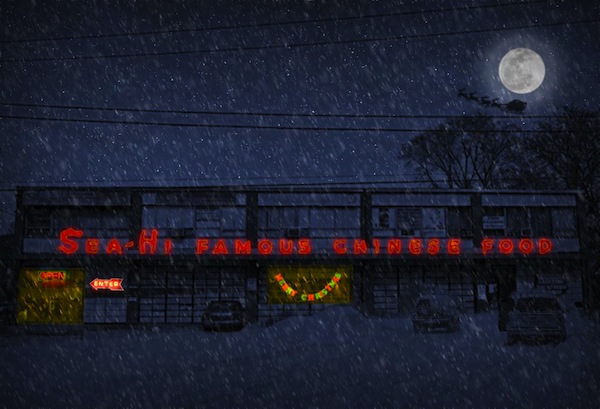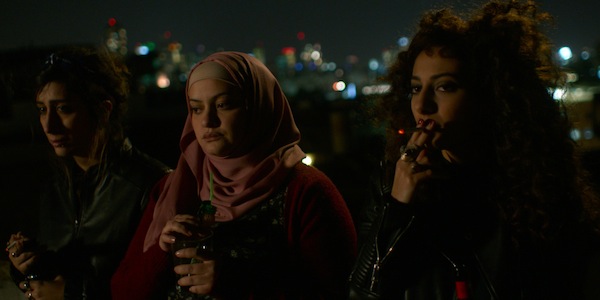(facebook.com/keepthechangefilm)
Like one of her favourite romantic comedies, Crossing Delancey, writer-director Rachel Israel’s narrative feature debut, Keep the Change, is a New York love story with a tangible Jewish undercurrent.
The romantic duo in the Vancouver Jewish Film Festival’s opening night selection readily self-identify as Jewish, but they share another quality that for most people primarily defines them: David (Brandon Polansky) and Sarah (Samantha Elisofon) are on the autism spectrum.
Refreshingly honest and sexually straightforward in its portrayal of the way people with autism interact with each other, with their families and with strangers, Keep the Change received two prizes when it premièred at the Tribeca Film Festival in April.
“A few of the characters are naturally unfiltered in the way they talk about sex, and I thought it was a beautiful and fun aspect of the characters,” Israel explained in a phone interview.
“A lot of depictions of people with autism shy away from sex, and I think it’s important to show that people on the spectrum have sex lives,” she said. “To shy away from it is in some way demeaning or infantilizing.”
Keep the Change receives its Canadian première when it opens the VJFF Nov. 2 at Fifth Avenue Cinemas, followed by a Nov. 12 screening at the Rothstein Theatre. It also screens Nov. 19 at the Roxy Theatre, as part of the Victoria International Jewish Film Festival.
Israel spent her childhood in the Princeton, N.J., area and her adolescence and teen years in Boca Raton, Fla., before pursuing her undergraduate degree at the Rhode Island School of Design. She moved to New York for her graduate studies in film at Columbia, where she refocused her first screenplay from a drama about David’s family to an endearing, awkward and rocky love story between he and Sarah.
Israel set about making a short film, and discovered a community of people with autism at the Manhattan Jewish Community Centre. She cast Brandon and Samantha and, some five years later, asked them to reprise their roles for a feature.
“Brandon’s search for love and companionship, and possibly sexual experience, is a defining part of his personality,” Israel said. “When I met him, I didn’t know he was on the spectrum … until he told me. When he told me he had autism, it was an awakening, because I thought of someone like Dustin Hoffman in Rain Man, someone who shies away from contact. And that was very much not the way Brandon was.”
His character’s Jewishness is front and centre, which may feed into some viewers’ judgment of his ostentatiously wealthy parents (played by Jewish actors Jessica Walter and Tibor Feldman). Sarah’s Jewish identity is much less pronounced but it could be a plus – in theory – in winning David’s parents’ acceptance.
“He is quietly desperate to have a girl, so it wouldn’t have stopped him at all [if Sarah wasn’t Jewish],” Israel said. “But it’s a big thing for many Jewish parents for your kids to stay in the tribe. He thinks that it will please his parents. But, more than that, for himself he wants some traditional things for his life. He wants a permanent loving relationship. I think he thinks that should be marriage. He very much wants the things that he’s seen his peers from childhood acquire, and he doesn’t understand why he shouldn’t have them.”
David and Sarah are fictional versions of the real people.
“We wrote it in collaboration with the cast, but they are playing fictional characters,” Israel emphasized. “They are not playing themselves. We’ve created characters that had some of their tendencies, while other things were different. They could definitely draw upon who they were to inform their characters.”
After Tribeca, Israel screened Keep the Change at the Los Angeles Film Festival and at Karlovy Vary in the Czech Republic, where it won two more prizes. Her grandfather, a financial supporter of the film, who escaped Czechoslovakia at 14 on one of the Kindertransports organized by Sir Nicholas Winton, attended the festival with Israel and the film.
For tickets and the full schedule for the VJFF (Nov. 2-12) and VIJFF (Nov. 18-21), visit vjff.org and vijff.ca, respectively.
– Michael Fox
***

About two dozen of the most popular Christmas songs were written by Jewish composers. An engaging documentary by Canadian producers, Dreaming of a Jewish Christmas, uses this fact as a jumping off point to explore the varied issues around Jewish relationships with Christmas, including Chinese food, the Chanukah-Christmas competition and some Jews’ conflicting desire to both fit in and remain distinctive from the majority culture.
The dreamlike documentary takes a retro, festive approach to the topic, beginning with a family of four arriving at a Chinese restaurant, circa the 1960s. Here, the wide-eyed children drink in the scene as waiters and fellow patrons break into song and chefs engage in kitchen percussions and choreography. Talking heads intersperse with these song-and-dance routines to explore, in an amusing way, the sometimes deep and multifaceted connections between Jews and the inescapable December holiday.
Jewish songsters are responsible for familiar tunes like “Walking in a Winter Wonderland” (Felix Bernard, born Felix William Bernhardt), “Chestnuts Roasting on an Open Fire” (Mel Tormé and Robert Wells, born Levinson) and “It’s the Most Wonderful Time of the Year” (George Wyle, born Bernard Weissman). The propensity for changing Jewish-sounding surnames is also addressed.
Mark Breslin, the founder of Yuk Yuk’s comedy club chain, puts a fine point on the Jewish role in Christmas music. “You could write a song three percent of the population would buy the record or you could write a song that 97% of the population will buy the record,” he says. “The businessman in me says go for the bigger market.”
Another comedian, Jackie Mason, dismisses the idea that there is anything odd about people writing songs about a holiday that is not their own. “Who cares if it’s your own holiday?” Mason says. “If I see a lot of cows on the street, am I going to write about a cow? Do I have to be a partner with cows, do I have to live with cows, to write a song about them? If everybody’s a Christian, that’s an easier sale, isn’t it?”
One commentator notes that almost all the Christmas carols written by Jews were what could be called “secular” songs. They are not about the birth of Jesus but about chestnuts, snow and winter coziness, reinforcing a new mythology that was emerging in the middle of the 20th century, which turned Christmas into a non-denominational winter celebration. In this, Jews and other non-Christians could more fully participate.
Ron Sidran, author of There Was a Fire: Jews, Music and the American Dream, cites Irving Berlin’s “White Christmas,” sung by Bing Crosby in the 1942 film Holiday Inn, as a turning point. “That song is the song where Irving Berlin de-Christs Christmas,” he says. “He turns Christmas into a holiday about snow.”
Calgary-born Ophira Eisenberg, who hosts NPR’s Ask Me Another radio quiz show, recalls receiving Chanukah gifts so she wouldn’t feel left out when her friends were getting visits from Santa. When the young Ophira asked her mother who the gifts came from, she was told that Moses came down from the mountain each year bringing presents to good little Jewish boys and girls. “Presents of dreidels and socks,” she adds wryly.
And while one speaker claims that Jewish composers wrote Christmas songs not as Jews, but as Americans, music journalist Robert Harris says “Rudolph the Red-Nosed Reindeer” is explicitly Jewish.
Rudolph’s creator, Robert May, said that he based the story of the reindeer – with his prominent nose, who was excluded from games with his peers and called names – on his own childhood as a Jewish American in the first half of the 20th century.
“And you know what’s incredible about Rudolph?” Harris says. “Rudolph doesn’t get a nose job. The point of Rudolph the red-nosed reindeer is not for Rudolph to blend in and become another reindeer. The point of Rudolph is for Rudolph to be appreciated for what he is.” Dreaming of a Jewish Christmas screens at the Vancouver Jewish Film Festival on Nov. 5.
– Pat Johnson
***

In Maysaloun Hamoud’s Bar Bahar (In Between), three young Palestinian women share an apartment in Tel Aviv as they struggle with the issues of religion, sexuality and overall identity. They live “in between” cultures. They are not Israeli enough – they are Palestinian, and are reminded of that fact occasionally. They are not Palestinian enough either – they want to escape the traditional role of a Palestinian woman. Centuries-old traditions and modernity clash in this film, as each of the main characters undergoes her own challenges and heartaches.
Leila is a lawyer. Educated, sophisticated and beautiful, she drinks and parties, smokes constantly and does drugs, but, in her heart, she wants to find love and purpose. While she doesn’t forgive betrayal, she is generous and kind to her friends – no matter how lousy she feels, how much she mourns her unfulfilled dreams, she is always ready to help her roommates.
Selma is a bartender and a lesbian, but her parents can’t even hear the word, much less accept their daughter’s sexual orientation. Their confrontation on screen is painful to watch. The parents are overwrought, unable to come to terms with their daughter’s choices. Selma herself is full of anguish, torn between her parents and her lover, even though she doesn’t say a word. Only her father talks, or rather screams, furiously. Her conflict and her parents’ desperation are powerful.
Nour is a university student, studying computer science. Religious and quiet, she wears a hijab and tries to reconcile herself with the traditional role of a Palestinian woman. Unlike her two roommates, she is not an overt rebel. She is betrothed, but her fiancé is scary and repulsive in his hypocrisy; he demands unquestioning compliance, and she tries, but she doesn’t love him.
The rape scene in the movie is not graphic, but its impact is immense. The incident and its aftermath puts all the relationships into perspective. It tests all three women’s courage and their humanity. It shows their capacity for compassion and their resilience.
The movie is simple on the surface, just a few days in the women’s lives, but a lot goes on behind the scenes, providing a multifaceted view of life in today’s Israel. All three roommates are living, breathing women, hoping for a better life, helping each other to achieve it. As much as the movie is their story, its themes are universal.
The film won several Israeli and international awards, and all of the awards are well-deserved.
Bar Bahar screens at the Vancouver Jewish Film Festival on Nov. 5.
– Olga Livshin

